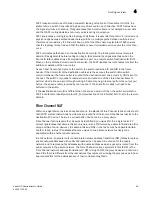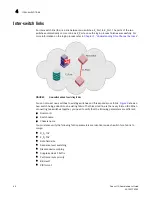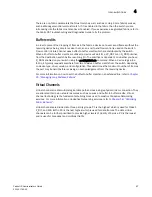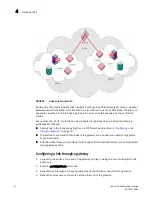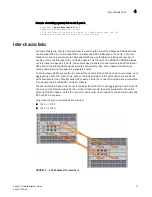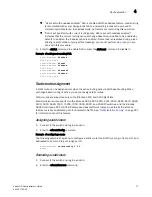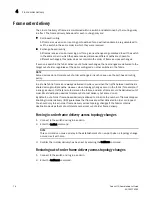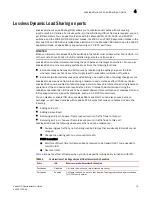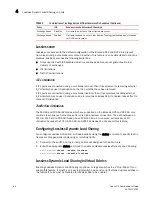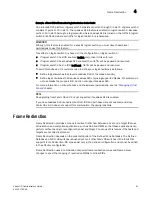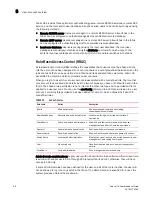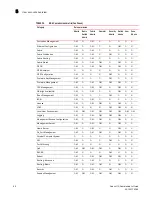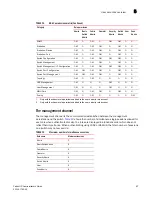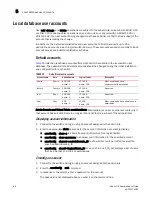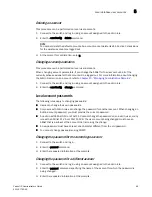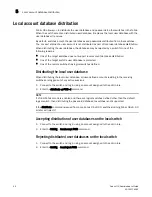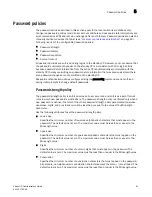
Fabric OS Administrator’s Guide
77
53-1001763-02
Route selection
4
•
”DLS is set with Lossless enabled.” DLS is enabled with the Lossless feature. Load sharing
is recomputed with every change in the fabric, and existing routes can be moved to
maintain optimal balance. In Lossless mode, no framers are lost during this operation.
•
"DLS is set by default with current routing policy. DLS is set with Lossless enabled."
Indicates that the current routing policy (exchange-based) requires DLS to be enabled by
default. In addition, the lossless option is enabled. Frame loss is prevented during a load
sharing re-computation. If you get this message, you cannot perform
step 3
, so you are
done with this procedure.
3. Enter the dlsSet command to enable DLS or enter the dlsReset command to disable it.
Example of setting and resetting DLS.
switch:admin>
dlsshow
DLS is not set
switch:admin>
dlsset
switch:admin>
dlsshow
DLS is set
switch:admin>
dlsreset
switch:admin>
dlsshow
DLS is not set
Static route assignment
A static route can be assigned only when the active routing policy is port-based routing. When
exchange-based routing is active, you cannot assign static routes.
Static routes are supported only on the Brocade 4100 and 5000 platforms.
Static routes are not supported on the Brocade 300, 4900, 5410, 5424, 5450, 5460, 5470, 5480,
5100, 5300, 5424, 7500, 7500E, 7600, 7800, 8000, and VA-40FC switches, and the Brocade
48000 or Brocade DCX or DCX-4S enterprise-class platforms. Instead, use the traffic isolation
feature to create a dedicated path for interswitch traffic. See
“Traffic Isolation Zoning”
on page 267
for information about this feature.
Assigning a static route
1. Connect to the switch and log in as admin.
2. Enter the uRouteConfig command.
Example of configuring a route
The following example shows how to configure a static route for all traffic coming in from port 1 and
addressed to domain 2 to go through port 5:
switch:admin>
urouteconfig 1 2 5
done.
Removing a static route
1. Connect to the switch and log in as admin.
2. Enter the uRouteRemove command.
Summary of Contents for 53-1001763-02
Page 1: ...53 1001763 02 13 September 2010 Fabric OS Administrator s Guide Supporting Fabric OS v6 4 0 ...
Page 4: ...iv Fabric OS Administrator s Guide 53 1001763 02 ...
Page 24: ...xxiv Fabric OS Administrator s Guide 53 1001763 02 ...
Page 28: ...xxviii Fabric OS Administrator s Guide 53 1001763 02 ...
Page 32: ...xxxii Fabric OS Administrator s Guide 53 1001763 02 ...
Page 40: ...xl Fabric OS Administrator s Guide 53 1001763 02 ...
Page 42: ...2 Fabric OS Administrator s Guide 53 1001763 02 ...
Page 54: ...14 Fabric OS Administrator s Guide 53 1001763 02 High availability of daemon processes 1 ...
Page 74: ...34 Fabric OS Administrator s Guide 53 1001763 02 Basic connections 2 ...
Page 102: ...62 Fabric OS Administrator s Guide 53 1001763 02 Audit log configuration 3 ...
Page 214: ...174 Fabric OS Administrator s Guide 53 1001763 02 Management interface security 7 ...
Page 228: ...188 Fabric OS Administrator s Guide 53 1001763 02 Brocade configuration form 8 ...
Page 276: ...236 Fabric OS Administrator s Guide 53 1001763 02 Creating a logical fabric using XISLs 10 ...
Page 404: ...364 Fabric OS Administrator s Guide 53 1001763 02 ...
Page 440: ...400 Fabric OS Administrator s Guide 53 1001763 02 Performance data collection 17 ...
Page 480: ...440 Fabric OS Administrator s Guide 53 1001763 02 F_Port masterless trunking 19 ...
Page 494: ...454 Fabric OS Administrator s Guide 53 1001763 02 Buffer credit recovery 20 ...
Page 574: ...534 Fabric OS Administrator s Guide 53 1001763 02 Hexadecimal overview E ...



